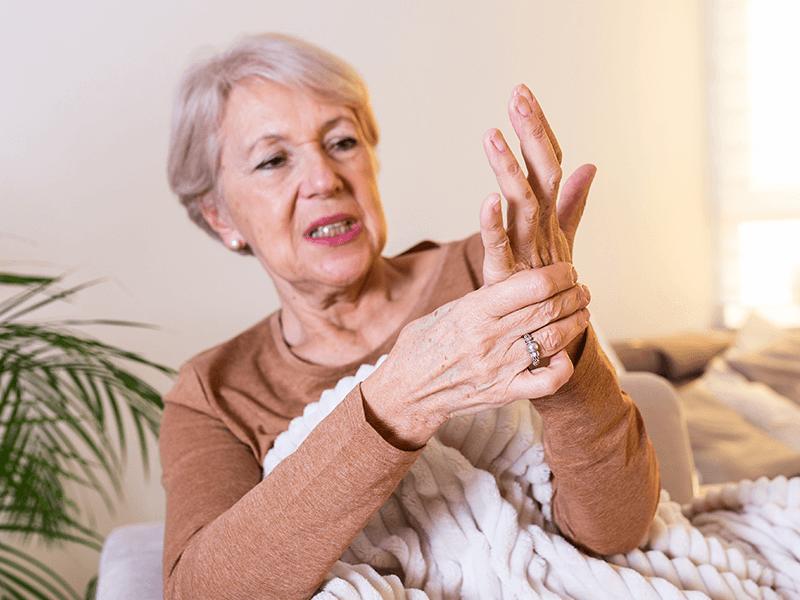Search
Find a Physician
Blog
May 4, 2022
There are many different reasons why your joints in the hands may be painful. If it is a chronic condition, it probably is arthritis of the hands.
Make no mistake, while pain is bad, chronic pain is far worse. It can ruin your mood and attitude, impact your everyday life, and even completely ruin your quality of life. Not to mention that, if things escalate, this issue may result in a loss of function in your hands. This would be a massive problem for your everyday life, even preventing you from working in certain fields (as well as enjoying some of your favorite hobbies).
In order not to allow things to go this far, here’s what you need to know about the arthritis of the hands.
Simply put, hand arthritis is an inflammation that causes pain, swelling, and stiffness in your hand joints. Now, due to the fact that your hand is one of the most complex areas of your body, the number of joints in this region is quite significant and therefore there are many joints which can be giving you pain.
Despite being classified as a single ailment, arthritis of the hands can be caused by a number of different factors and conditions.
Risk groups are determined based on your: age, sex, ethnicity, or even genetic predisposition.
Nonetheless, there are three conditions that stand out as the root cause of this medical predicament.
Osteoarthritis
The first common origin of arthritis of the hands is the so-called osteoarthritis. The simplest way to describe this problem is as – wear and tear. Due to normal joint use, genetic predisposition, post-traumatic, and bad luck, the cartilage breaks down and wears away. This is painful and can cause swelling as well as limited range of motion. It can affect almost any joint in the hand, but most commonly, it affects finger joints and the base of your thumb.
Rheumatoid arthritis
This is an inflammatory, autoimmune disease where the body mistakenly attacks normal joints and, as a result, the cartilage breaks down. This often affects the small joints of your wrists, hands, and fingers. Another thing worth mentioning is that it has a tendency to affect both sides of your body. This means that pain will be present in both hands simultaneously.
Psoriatic arthritis
Lesser-known form of hand arthritis is the so-called psoriatic arthritis. Other than just affecting your skin, it also affects your joints. As a result, your fingers will get swollen. The biggest problem with diagnosing it properly is the fact that the majority of its symptoms are similar to rheumatoid arthritis. It is the skin-based symptoms that make the distinction a lot easier.
One of the most important things is for you to learn how to recognize early signs of arthritis in your hands. This will give you a chance to react in time and reduce the potential consequences before things become too serious.
The first symptom is swollen joints, however, during the early stages, you won’t have a problem with this all the time. In fact, the worst symptoms are to be expected early in the morning. Morning pain and stiffness in your hands are quite common when it comes to this.Pain may occur with forceful dexterity (opening a jar) or with rapid overuse situations (writing Christmas cards).
The pain itself is often described as either dull or burning.
Make no mistake, if not addressed for too long, the situation will become progressively worse. The joint pain will worsen if not treated and, soon, the situation might become so bad that it becomes visible even to a layman. For those who still might need some convincing that the situation is serious, it might be worth looking up what the hand may start to look like if things escalate.
The reason why prevention is always problematic is that, before the first symptoms, nobody thinks about hand arthritis, nor do they worry about how to prevent it. There simply seems like there’s no reason for it. Still, for those who believe that they have a genetic predisposition towards it, taking some necessary steps might be the best course of action. Even simple exercises to keep your tendons and ligaments flexible may be of immense assistance.
Even after you develop this unfortunate condition, there are so many different stretches and exercises that you should take into consideration. These can somewhat alleviate the pain and make the condition somewhat bearable.
Another thing that can make the pain more bearable is an over-the-counter medication. Still, this should only be consumed when prescribed by a specialist.
Most importantly, you need to abandon the idea that things will just get better on their own. As we’ve mentioned, they won’t even remain the same either. The safest course of action would be for you to see a specialist hand surgeon and ask about the potential treatment or therapy. Don’t worry, if a non-invasive method is a better solution in your particular scenario, they’ll be the first to advise against surgery.
The sooner you recognize the problem, the better your chances of recovery will be. So, it is vital to look for professional help, immediately after noticing symptoms of hand arthritis.
While genetic predisposition, age, sex, and even ethnicity may make you a risk group, the truth is that you probably won’t think too much about the arthritis of the hands before the first symptoms kick in. Therefore, there are top three things you need to focus on:
In order to have a professional take a look at your situation, you should definitely find a hand and wrist specialist at The Orthopedic Institute of New Jersey to take care of you.
This article was reviewed and approved by an orthopedic surgeon as we place a high premium on accuracy for our patients and potential patients.